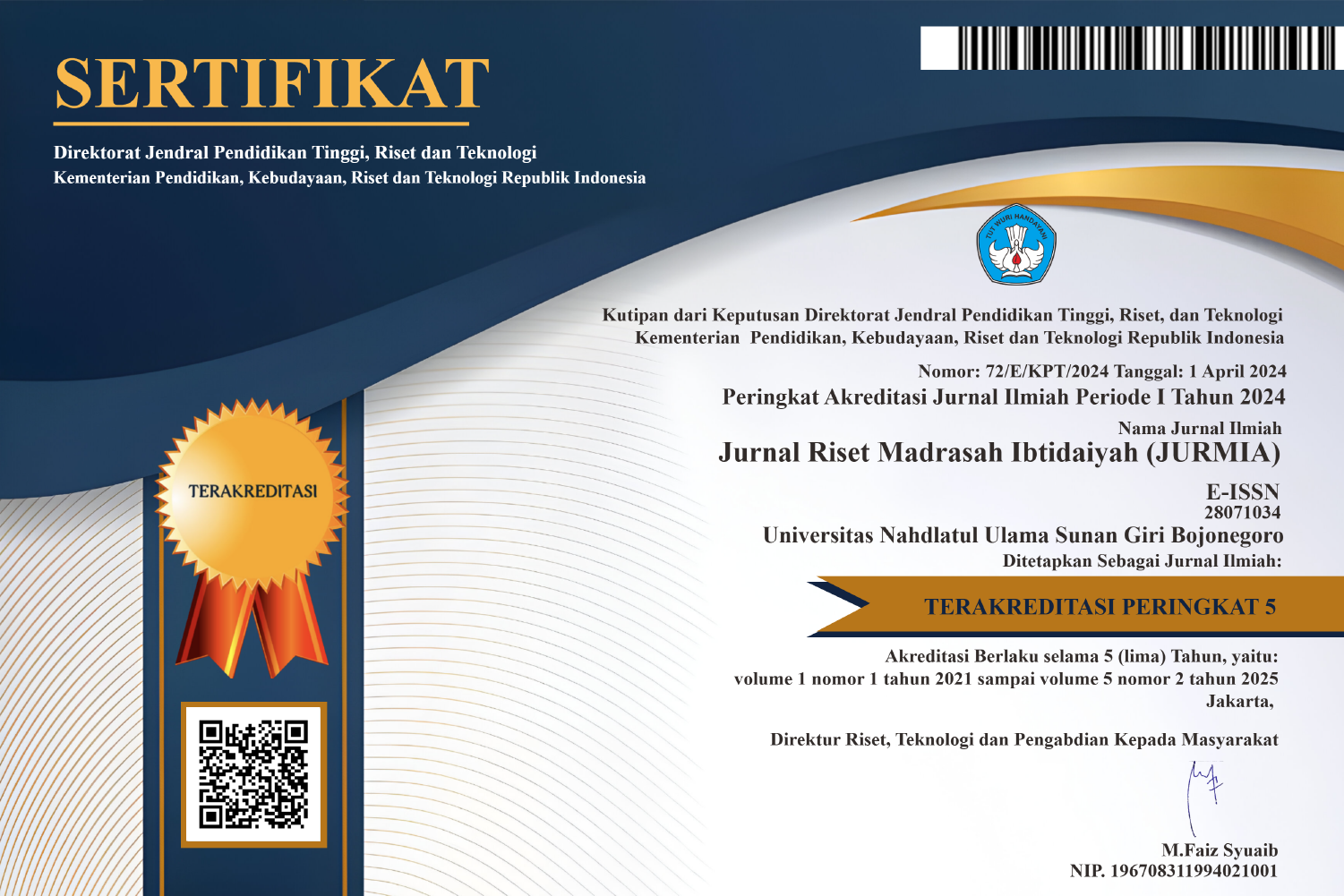Effects of Drug Abuse on Primary Education: An Overview Context

DOI:
https://doi.org/10.32665/jurmia.v4i1.2791Keywords:
Drug abuse, primary education, Child DevelopmentAbstract
The focused aim of this paper is to utilize review/concept methods of research to elucidate drug abuse and its effects on education. The paper, therefore, explains drug abuse under the following: Negative effects on academic performance, elicitation of malnutrition, instigation of ill-health, causing absenteeism, factors increasing drug abuse, features of drug abusers, theories, causes, effects, and prevention. Indeed, drug abuse education in many ways, to save many of our youngsters interventions are needed. The research methodology employed a systematic literature review approach, which involved identifying, selecting, and analyzing relevant academic sources pertaining to the impact of drug abuse on school children. The initial step included searching of various databases such as PubMed, Google Scholar, and academic library catalogs using keywords related to drug abuse, elementary education, and child development. Following the search process, articles were screened based on inclusion criteria, including publication date, relevance to the research topic, and methodological rigor. Subsequently, the selected literature was synthesized to identify common themes, patterns, and findings regarding the adverse effects of drug abuse on academic performance, social behavior, and overall well-being among elementary school students. The results of the literature review underscored the urgent need for targeted prevention and intervention strategies to address the multifaceted challenges posed by drug abuse in elementary school settings.
References
Akanbi, M. I., Godwin, A., Anyio, B. T., Muhammad, M., & Ajiboye, S. A. (2015). Impact of substance abuse on academic performance among adolescent students of colleges of education in Kwara State.
Amua-Sekyi, J. (2013). Drug abuse on students’ academic performance in selected senior high schools in the Greater Accra Metropolis.
Ari Susetiyo, & Suttrisno. (2022). Penanaman Nilai-Nilai Pendidikan Karakter di Madrasah Ibtida’iyah Darul Ulum Kediri. Jurnal Riset Madrasah Ibtidaiyah (JURMIA), 2(2), 277–283. https://doi.org/10.32665/jurmia.v2i2.544
Bulfin, S., & North, S. (2008). Negotiating Digital Literacy Practices Across School and Home : Case Studies of Young People in Australia Negotiating Digital Literacy Practices Across School and Home : Case Studies of Young People in Australia. September 2015. https://doi.org/10.2167/le750.0
Christine, W. M. (2022). Impact of drug abuse on students academic performance in selected senior secondary schools, Buikwe District.
Congress, U. S., & Technology Assessment, O. (1993). Biological components of substance abuse and addiction, OTA-BP-BBS-1-17(Washington,DC:US. Government Printing Office.
Dada, S., Burnhams, N. H., Hout, M. C., & Parry, C. D. H. (2015). Codeine misuse and dependence in South Africa. Learning from substance abuse treatment admissions. South Africa Medical Journal, 105(9), 776–779.
Ekeagwu, I. (2028). Nigerian youths and drug abuse. AJMEA, 4(1), 41–52.
ElShafie, H. S., Camele, I., & Mohamed, A. A. (2023). A comprehensive review on the biological, agricultural and Pharmaceutical properties of secondary metabolites based-plant origin. International Journal of Molecular Sciences, 24(3266), 1–24.
EM Sinaga, S Salamun, S Suttrisno, A Azis, S Pramudibyo, H. Z. (2023). Metodologi Penelitian Pendidikan: Sebuah Pengantar (1st ed.). Yayasan Kita Menulis.
Enambe, D. C., & Eba, M. A. (2021). Nigeria drug abuse and the Nigerian youth. Jurnal Ilmu Sosiologi Dialektika Kontemporer, 8(1), 1–17.
Essack, Z., & Groenewald, C. J. (2020). It’s like making your own alcohol at home: Factors influencing adolescent use of over-the-counter cough syrup. South Africa Journal of Child, 14(3), 144–147.
Fitri, A., Nursikin, M., & Amin, K. (2023). Peran Ganda Guru Pendidikan Agama Islam dalam Membimbing Siswa Bermasalah di SD Islam Al-Rasyid Pekanbaru. Journal on Education, 5(3), 9710–9717.
K., O. (2017). Strategies for prevention or reduction of drug use for adolescents: systematic literature review. Review Electronic Enforcement,18(e1172). H.M.C.T.
Kaluwe, N. (2019). An assessment of effects of drug abuse on pupils academic performance, a case study of one of the primary schools in Windhoek.
Kavitha, J., S., S., & N, S. (2022). Self-medication in today’s generation without knowledge as self inflicted harm. Archive of Pharmacy Practice, 1(4), 1–13.
Khan, A., Khan, S., Ababs, S. A., & Khan, M. (2018). Health implications associated with self-medication. Journal of Physical Fitness, Medicine and Treatment in Sports, 1(4), 1–3.
M.I., A., Okafor, C., & Research. (2014). Effect of drug abuse on the academic performance of undergraduate students in Edo state. International Journal of Scientific and Engineering, 13(4), 662-674.
Mamman, H. (2014). Effects of school-based programme on benylin with codeine abuse prevention among secondary school students in Katsina state.
Manish, G., Deepali, T., & Neetu, S. (2020). Effect of the drug abuse on the academic performance of the students adolescents. Biomedical Journal of Scientific and Technical Research, 28(3), 21601–21610.
Meier, R., Murdick, N. L., & Lytle, C. (2014). The Safety of Science Activities in an Inclusive Elementary Classroom. Open Journal of Social Sciences, 02(09), 278–288. https://doi.org/10.4236/jss.2014.29046
Murat, B., Gokmen, A., & D, E. (2016). The school absenteeism among high school students: contributing factors. Educational Sciences: Theory and Practice, 16(6), 1819–1831.
Nasiru, B. S., Musawa, T. S., Hassan, H. M., & Ejembi, E. A. (2019). Exploring the perceived factors that lead to substance abuse among youth in Northern Nigeria. Advance Research Journal of Medical and Clinical Science, 5(9), 15–23.
Nchindila, B., & Corrigan, T. (2020). The Essence of Academic Performance. Intechopen.
Ndidibuike, N. D., & Nwadiuso, N. D. (2019). Effects of drug abuse on the academic performance of secondary school students in public secondary schools in Udi local government area of Enugu state. Advance Journal of Education and Social Sciences, 4(8), 1–8.
Ngamaba, K. H., Lombo, L. S., Lombo, G., & Viviar, N. E. (2021). Causes and consequences of school dropout in Kinshasha: Students perspectives before and after dropping out. Journal of African Education, 2(3), 175–192.
Odhiambo, O. D. (2013). Effects of drug and substance a use on girls in Nakuru County, Kenya. International Journal of Science and Research, 10(8), 454–465.
Ogunsola, S. O., Fajemisin, E. A., Aiyenuro, A. E., & Tunde, A. A. (2013). Experiences and Projections for Drug Abuse Sensitization and Eradication Among Youths in South West, Nigeria. Journal of Alcohol Drug Dependency and Substance Abuse, 6, 018–26.
Okari, J., & Masese. (2018). Effects of drug abuse on academic performance among secondary school students in Masaba North sub County Nyamira County, Kenya. International Journal of Management and Commerce Innovations, 6(1), 1884–1889.
Qureshi, J. A., Bhatti, T., & Shah, S. (2020). Effects of malnutrition on students attendance and annual examination score at primary school level in District Tharparkar, Sindh. Orient Research Journal of Social Sciences, 5(1), 1–10.
Sajid, M. A., Tatlah, I. A., & Butt. (2020). Causes of drug abuse among university students in Pakistan: variation by gender and drug type. Pakistan Social Sciences Review, 4(1), 459–468.
Sarkingobir, Y., Lead, C., Chromium, N., Zinc, I., & Metals, N.-H. (2023). Exploratory Study On Selected Heavy. Rio Gallegos.
Shabbir, M., Zaman, Q., & Alif. (2019). Effects of malnutrition on the academic performance: A case study of grade 6-8 learners in Punjab, Pakistan. Review of Economics and Development Studies, 5(4), 713–719.
Steve Olson and Susan Loucks-Horsley. (2015). Committee on Development of an Addendum to the National Science Education Standards on Scientific Inquiry. National Research Council.
Suttrisno. (2021). Analisis Dampak Pembelajaran Daring terhadap Motivasi Belajar Siswa Madrasah Ibtidaiyah. Jurnal Riset Madrasah Ibtidaiyah (JURMIA), 1(1), 1–10. https://doi.org/10.32665/jurmia.v1i1.190
Thongseiratch, T., & Chandeying. (2020). Chronic illnesses and student academic performance. Journal of Health Science and Medical Research, 38(3), 245–253.
Tsang, S. K., & Au, W. Y. (2012). Cough mixture abuse and rhabdomyolysis. Hong Kong Medical Journal, 18(1), 68–69.
Umar, A., Garba, A., Jibrilu, A. L., & Studies 11(2), 52-64. (2023). The effect and influence of drug abuse to the students of higher institutions in their educational attainment in tertiary institutions in Katsina State, Nigeria. International Journal of Innovative Development and Policy, 11(2), 52–64.
Umar, A. I., Sarkingobir, Y., Adamu, H. W., Faruk, A., & Dikko, M. (2023). Extent of some heavy metals in cough syrups abused in Sokoto, Nigeria. Chula Medical Journal, 67(4), 251–256.
Vilchez, J. I. (2018). Cognitive effects of drug abuse. Biomedical Journal of Scientific and Technical Research, 5(1), 4272–4278.
Wairagkar, N. S., Das, J., Kumar, S., Mahanta, J., Satyanarayana, K., Phukan, R. K., Chetia, M., & Goswami, S. K. (1994). Codeine containing cough syrup addiction in Assam and Nagaland. Indian Journal of Psychiatry, 36(3), 129–132.
Wu, Q., Yu, J., Yang, C., Chen, J., Yang, L., Zhang, H., Teng, S., Li, J., Yan, D., Cao, J., Zhao, Y., & Wang, Z. (2016). Nonmedical use of cough syrup among secondary vocational school students. A national survey in China. Medicine, 95(10), 1–8.
Yildiz, M. (2021). The Factors Causing English Speaking Anxiety On Non-English Major Academics While Using English As A Medium Of Instruction. TEFLIN Journal, 32(2), 389–412. https://doi.org/10.15639/HTTP:/TEFLINJOURNAL.V32I2/389-412
Zamanian, B., Goodarzi, A., & H, E. (2019). Genetics influence drug abuse and addiction; interactions of endophenotypes and genotypes. Basic and Clinical Neuroscien, 1(3), 5–16.
Zemba, M. (2022). The causes and effects of drug abuse on pupils academic performance: A case study of Mindolo secondary school Kitwe, Zambia. International Journal of Multidiscpinary Research and Analysis, 5(8), 2253–2260.
Zerga, A. A., Tadesse, S. E., Ayele, F. Y., & Ayele, S. Z. (2022). Impact of Malnutrition on the academic performance of school children in Ethiopia: A systematic review and meta-analysis. SAGE Open Medicine, 10(1), 1–10.
Zhou, Z. (2021). Drug abuse and adolescents cognitive development based on the perspectives of etiology, impacts, and therapy. Advances in Social Science, Education and Humanities Research, 6(37), 590–595.
Downloads
Published
Issue
Section
License
Copyright (c) 2024 Yusuf Sarkingobir, Ummu Tukur

This work is licensed under a Creative Commons Attribution 4.0 International License.
 PDF Download: 1095
PDF Download: 1095










